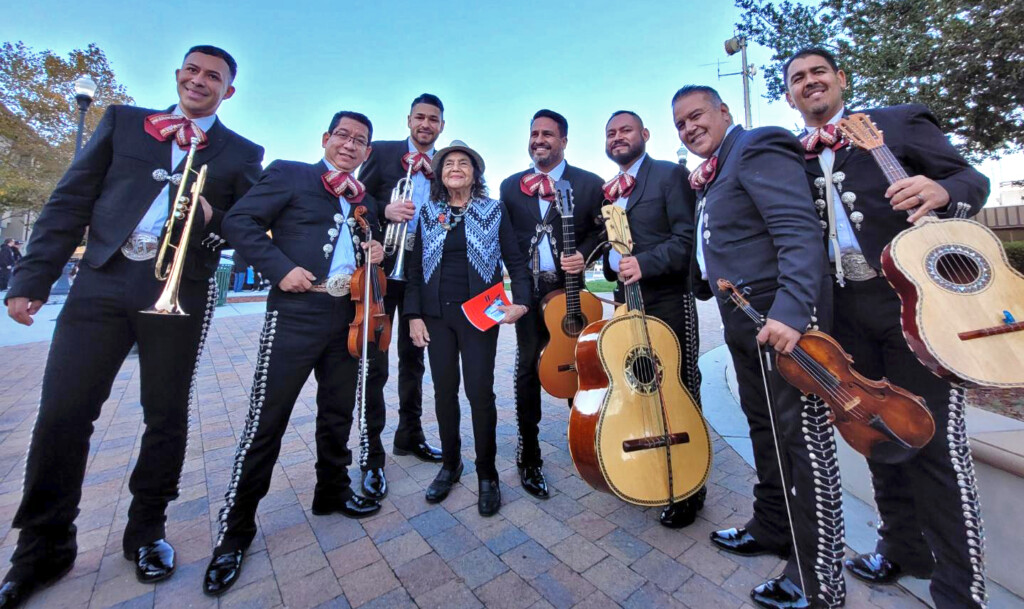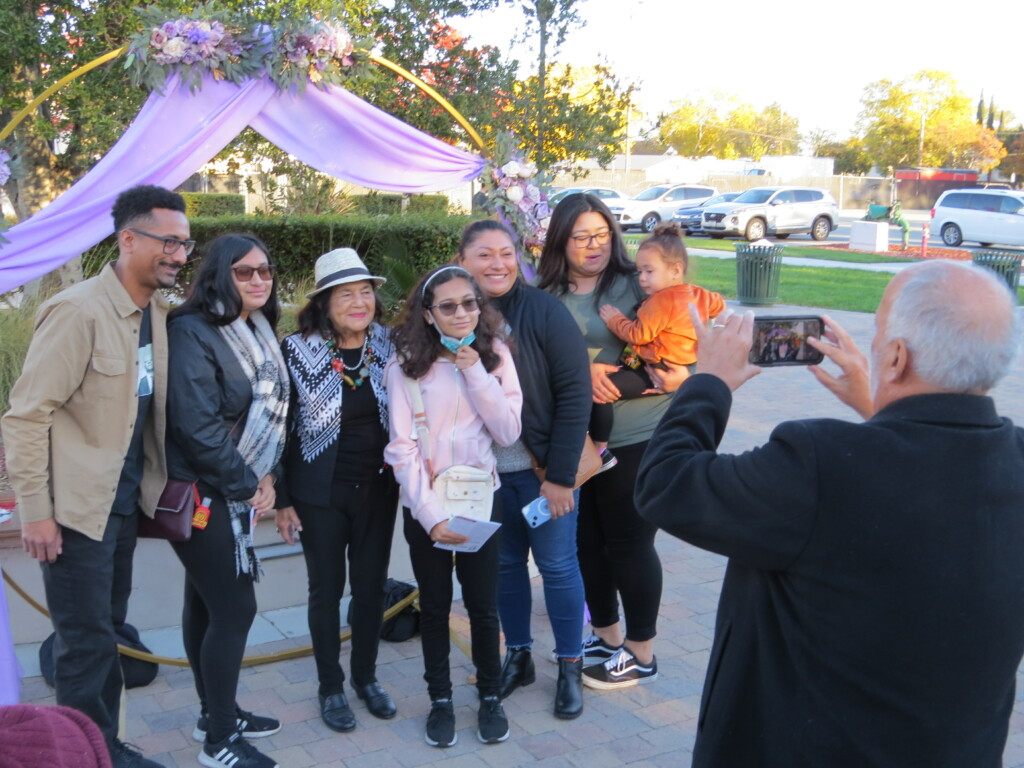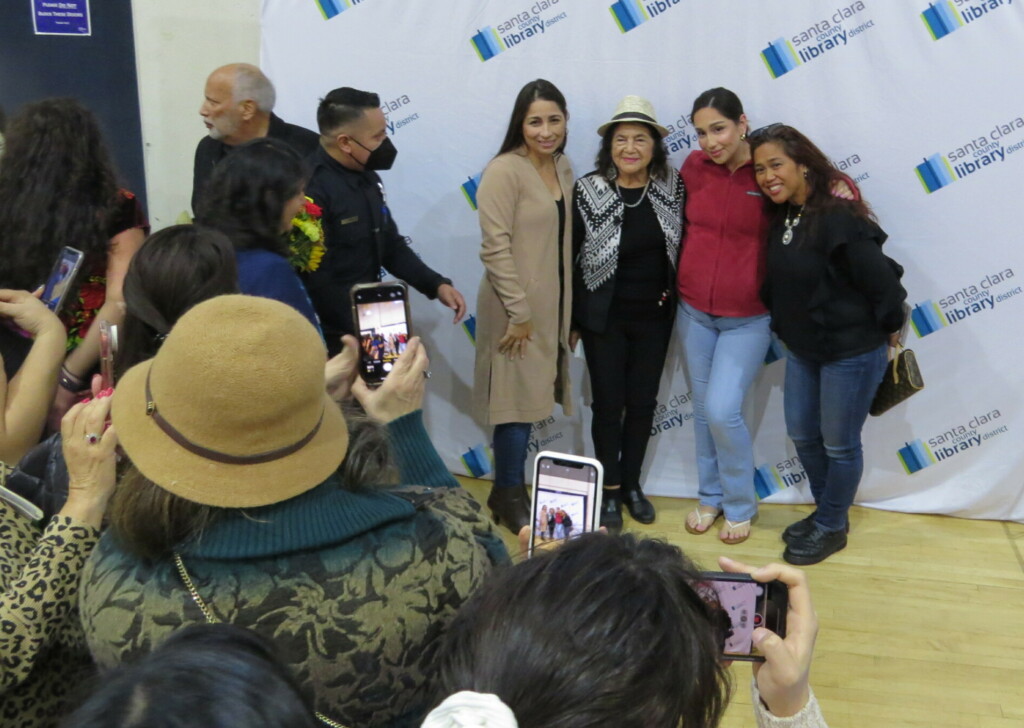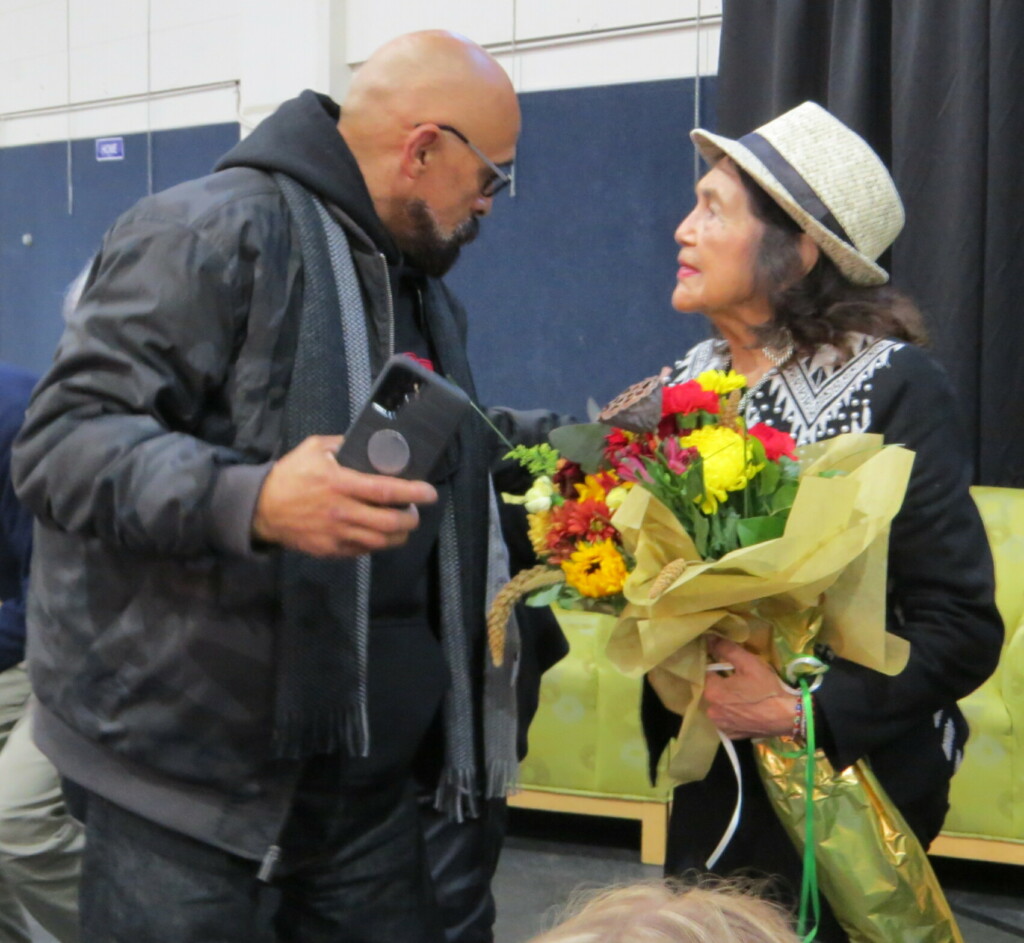Main story: Activist Huerta shares life stories to open library’s new exhibit
Panel presentation encouraged audience to be positive, act to make world better
![]()

Mariachi Tapatio musicians take a moment at the Nov. 12 event to pose for a photo with legendary labor rights leader Dolores Huerta. Photo courtesy Jasmine Guzman (Aguilera)
By Calvin Nuttall
Hardship, resiliency, community, and progress.
To celebrate the opening of a Smithsonian exhibition at the Gilroy Library illustrating Dolores Huerta’s life, the Latina civil rights activist shared with a standing room audience her stories featuring these qualities. In the 1960s and ‘70s, she worked with Cesar Chavez to fight for farmworkers’ rights.
Huerta, 92, was joined Nov. 12 on the Wheeler Community Center stage by esteemed Mexican American author Francisco Jiménez and Chicano filmmaker and playwright Luis Valdez in a panel talk moderated by NBC Bay Area News reporter Damian Trujillo.
The event was hosted by the Santa Clara County Library District to present the Smithsonian Institution Traveling Exhibit’s Dolores Huerta: Revolution in the Fields/Revolución en los Campos. The free bilingual exhibition is on display at the Gilroy Library through Jan. 23. It features reproductions of historic and personal photographs detailing Huerta’s life from her early influences, through the United Farm Workers’ grape boycotts and landmark agreements with grape-growing agriculture conglomerates.
CLICK HERE TO WATCH VIDEO OF THE NOVEMBER 12 PANAL PRESENTATION
At a time when women often played domestic roles, Huerta and other activists challenged the economic system to create a better life for farmworkers and their families. She coined the popular UFW slogan, “!Sí, se puede!” (“Yes, we can!”)
When activists are trying to help people by doing positive activities in their community, they often forget about their personal problems, Huerta told the audience of about 300 people.

Dolores Huerta took time for photos with her fans after the Nov.12 panel presentation. Photo by Marty Cheek
“We all have problems,” she said. “But when you’re focusing on organizing people, and you’re delivering that message of justice, that we can do this, you forget about your own personal issues. Empowering other people is what you’re doing, and you forget about yourself, and I think that’s really important. That gives you that kind of energy that you need.”
After more than six decades as an activist, Huerta sees society moving in a positive direction. She noted that Assemblyman Robert Rivas, who represents Gilroy and attended the presentation, was selected recently as Assembly Speaker. He’s the grandson of farm workers.
She described how important education is in bringing social justice to minorities.
“By the time I graduated from high school, most of my friends, Latinos, Asians, Blacks, they had dropped out, or were pushed out,” she said. “And when I went to college there were only five of us Latinos, and some of them had changed their names. They didn’t even want to identify as Latinos.”
More Latinos attend college now as well as an increasing number of women seeking higher education, she said.
“There are now more women in law school, becoming attorneys — and also becoming engineers and doctors,” she said. “So we can see there is a lot of progress that has been made. But we know with progress comes push-back. . . . We still have a lot of work to do to make sure that we get the representation and the voices and the policies that we need that will help our communities.”
During the panel discussion Jiménez emphasized Huerta’s point about the accomplishments of Latinos in political positions, giving as an example U.S. Sen. Alex Padilla and noting a record 45 Latino legislators grabbing seats in Congress in the Nov. 8 election.

Dolores Huerta took time for photos with her fans after the Nov.12 panel presentation. Photo by Marty Cheek
“When we look back at when we started to where we’re at now, we have made progress, and we should focus on the positive and not the negative,” he said. “As long as we continue to have hope and faith that we can make more progress, we will do that. But we cannot let anything distract us from our goals, and that is to help everybody in our community to improve our lives and the lives of their children. We have to become engaged and vote and not give up. ¡Sí, se puede!”
Valdez encouraged the audience not to be deceived by negative people who are fearful and thus attacking democracy. During the boycotts of the 1960s, as a playwright he wrote short dramas performed on the flatbed trucks that encouraged farmworkers to support the civil rights goals of the UFW. He was in high school in the 1950s when Chavez lived in Santa Clara County and was impressed by the organizing done in the region.
“I am encouraged. I am inspired by the progress that has been made,” he told the crowd. “Don’t let the white male view that is in despair throw you. Women are moving forward. Thank God, finally women are (rising) in America in terms of woman power.”
He called Huerta “the embodiment of women power” for her activism over the decades.
“All of the young women that are alive today need to take inspiration and to know that they are safe in their future and that they can make things happen,” he said. “But don’t let the young men get intimidated either. Don’t back off. Keep moving. Share the space, share the power, share the future, because the future is ours.”

Dolores Huerta speaks with a man after the panel talk.
Photo by Marty Cheek
The Smithsonian exhibit on Huerta’s life educates multiple generations of South Valley residents about the impact of her activism, said Adam Escoto, a trustee on the Morgan Hill Unified School District Board. The retired educator was involved in the farmworkers’ rights movement with Chavez starting in the 1960s.
“While walking through the Gilroy Library exhibit I overheard grandparents sharing with their family members the importance of learning a version of American history that is often not told or misrepresented about the farm labor movement,” he said.
Escoto attended the presentation with his wife, Laura Gonzalez-Escoto. The stories the three panel speakers told helped remind the audience that the power of community action can affect the changes society strives for, he said.
“We can take action by voting, organizing our communities, educating ourselves on the issues and opportunities in our communities, regionally, statewide and nationally,” he said. “Equally important, we must change our attitudes about ourselves and others. Si, se puede.”
During the panel discussion, Trujillo asked the civil rights activist: “Do we see another Dolores Huerta out there? Have we identified somebody?”
Huerta laughed and said, “Oh, let me tell you, there are a lot of young Latina activists out there. Not just young, also middle-aged. There are some revolutionary abuelas (grandmothers) out there. And everywhere you go, our people are on fire. They’re out organizing. They’re making things a lot better.”
Calvin Nuttall is a Morgan Hill resident who has a passion for science, technology and politics.


